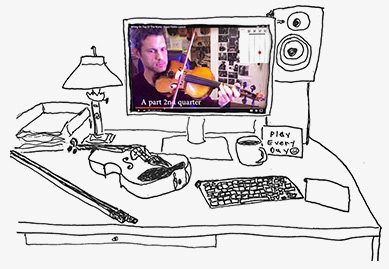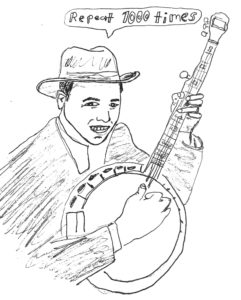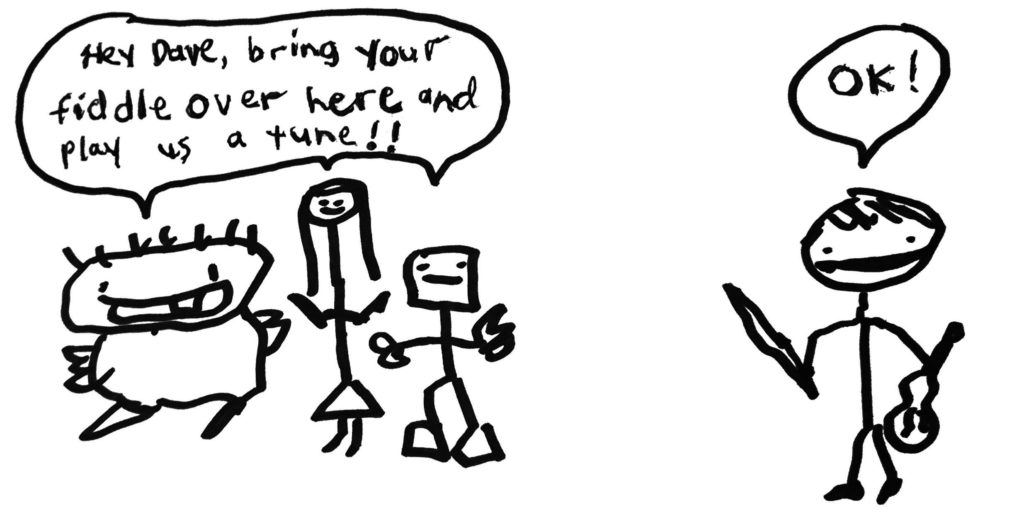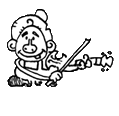The Practice Challenge of Fiddling
In this lesson I’ll help you to establish a consistent and enjoyable practice habit. It’s a long article so I’ll give you the take-home message up front:
All music students face three big challenges when learning an instrument:
- Practice Challenge
- Physical Challenge
- Emotional Challenge
Daily practice is the single most important thing that any musician needs to do. Seems like it should be easy. But a lot of folks have trouble establishing this essential habit.
They only practice when they feel like it. The danger with this approach is that it slows down your progress. When that happens, you feel like you’re treading water or going backwards. It gets discouraging. You start to feel let down and say things like, “Maybe I’m not cut out to play the fiddle…”
In this lesson, I’ll help you to overcome this challenge of daily practice, so you can achieve your goal of being a fiddler. I’ll show you ways to make this habit easy. Plus, I’ll show you ways to make it enjoyable. Because if you enjoy practicing, then you’ll naturally do it every day.
With that in mind, here’s an intentional practice strategy for you:

I’ll go into more detail below, giving you an action step for each strategy.
1. Play for at least two minutes a day

In the beginning, you want to make it ridiculously easy to play every day. Here’s an amazing strategy to establish this habit: Commit to playing for just two minutes a day. That’s it!
You might be thinking, “That’s crazy. How could I possibly learn this challenging instrument with only two minutes of practice a day?”
The goal of this strategy is to train your mind and body to automatically practice. Make it like brushing your teeth. Then you don’t have to think about it.

Woody Allen once said, “80% of success is just showing up.” By committing to just two minutes of practice a day, you train yourself to show up.
James Clear formulated the idea of the Two-Minute Rule in his book Atomic Habits. He says, “A habit must be established before it can be improved.” Once the habit is established, then you build on it. Your practice periods will naturally become longer, more in-depth and more enjoyable.
- What can be done in two minutes? You can simply pick up the fiddle and bow on an open string. Or if you already know a tune, you can simply play that for two minutes.
- If you feel resistance, then say out loud, “Well, two minutes is not that big a deal. I can do that!”
- If you feel like playing longer (which you probably will) then go ahead.
2. Find a regular time and place to practice

The goal is to make music practice an automatic behavior. You don’t want to be deciding whether you should practice or not. Try to establish cues that will signal you to pick up the fiddle.
If you make an effort to practice at a regular time and place, then you train your body and brain to automatically do this. Each day that you practice at the same time and location, you strengthen the cue to practice the next day at that time and location. And if you repeat that behavior enough times, it soon becomes an unconscious habit.

- It will be easier to establish a regular practice habit if you add it to an existing habit or routine.
- So if you have coffee every day at 7:30 AM, then practice right after that. Strengthen the habit by saying or writing, “After I drink coffee, I’ll practice the fiddle.”
- This works because it harnesses the existing habit to establish the new habit of music practice. So it ultimately takes less energy, thought and willpower to play every day.
3. Short practice sessions, high frequency

You’re more likely to establish any habit if you repeat it frequently.
So it’s better to practice 20 minutes a day, six days a week then to practice two hours on Saturday and not pick it up for a week after that.
If you frequently repeat an action, it will naturally be encoded in the body as a habit. By not having to make this decision, it saves you energy. Then your brain will happily say, “Yay, I don’t have to think about whether I should practice or not. Now I can concentrate on the fun part: learning and playing music!”
Another way to think about this is that daily practice earns you compound interest on your time. If you improve just 1% every day, then over the course of a month, you could potentially improve by 30%. In other words, that tiny bit of daily progress adds up to a huge improvement over time.

- Get a wall calendar. Put an X in the box for each day that you practice.
- You’ll feel good as you see the chain of Xs growing. This will reinforce the daily practice habit.
- Jerry Seinfeld used the “Don’t Break The Chain” strategy to write jokes on a daily basis.
4. Tell others that you’re learning the fiddle

Tell friends, family, roommates, other FiddleHed students and even random people that you have embarked on your fiddle journey.
This public commitment will spur you on. You’ll be less likely to give up because you don’t want to let people down. The official term for this is accountability. This strategy will help you stick to any new habit like exercise, meditation, or healthy eating.
You also signal to everyone that music is important to you. You want to train people in your life to give you time and space to do this thing you love.
Action step: Tell one person that you’re learning the fiddle
- This person is your accountability partner.
- Make a 30-second video of yourself playing something and send it to them. Then each month, send them a new video.
- Knowing that you want to send them a monthly video will encourage you to practice and improve.
- You can also post these videos to the Student Video Exchange on FiddleHed. There you’ll find a supportive community of fellow students who understand the struggles of learning the fiddle.
5. Take on the identity of a musician

Too many people give up on music because they compare themselves to the greatest musicians of all time. But what does it really mean to be a musician? Does it mean you’re rich and famous? Does it mean you play with mind-boggling technical ability? Maybe it means your cat doesn’t give you the evil eye when you start to practice.

Here’s a radically simple definition: a musician is someone who plays every day. This means that being a fiddler is a realistic goal. It’s something that you can actually accomplish if you follow and intentional practice plan.
The goal is to make music practice an intrinsically rewarding experience. If that happens on a consistent basis, then you’ll come to identify as a fiddler. You’ll need less willpower and motivation to play once you start to think of yourself as a fiddler.
Ask yourself, “What would a musician do?” A musician picks up the instrument and practices every day. They don’t have to think hard about whether they should practice or not. If a musician has a show to play, they simply show up. Whether they feel like it or not. Your identity as a musician will keep you practicing when other distractions arise, like Netflix, social media and viral cat videos.
A great fringe benefit of learning the fiddle is that you now have something fun and interesting to talk about with your friends. This further reinforces your identity of a fiddler.

- Write the words “Play Every Day” on an index card and post it somewhere where you’ll see it every day: on the refrigerator, your desk or wherever you practice.
- This mantra strengthens your intention to pick up the fiddle each day. And it reinforces your identity as a fiddler.
- When you start and end your practice sessions, say “Play Every Day” out loud. Take it a step further by saying the mantra when you wake up and when you go to bed 🌛.
Let’s sum up…

Are you ready to begin your fiddle journey? I’ll send you some free lessons tailored to your current skill level.
Click here to become a FiddleHed!
Further Learning
Here are two great books to help you understand how habits work. Establish good ones and stop the bad ones.
- The Power of Habit by Charles Duhigg
- Atomic Habits by James Clear
Two ways I can help you level up your fiddling
- Sign up for the FiddleHed newsletter below.
- Sign up for the Free Two-week Trial. You’ll get full access to all courses and group lessons. Plus, I’ll send you some free lessons tailored to your current skill level.
Thanks for being here 🙏
Return to Fiddle Questions >>
Return to How To Practice Music >>
Leave a Reply
You must be logged in to post a comment.

Excellent article. Thank you!
Glad you resonate on this, Lisa!
Thank you!!!!!♥️
Thank, that was useful and good.
I’ll do it after I make a coffee with my la pavoni machine in the morning
Thanks for the lesson, Jason! Loved it!!
All these things are true, and I’ve broken every rule. I bought a violin about 5 years ago with the intent of being the musician I’ve always wanted to be. After 5 years of hit & miss practice, excuses & procrastinating I’ve probably accumulated a total of 6 months practice time. I never thought of myself as a musician, always the wannabe.
Many years ago a physician friend gave me this advise when I was thinking about going to the University for a degree in Nursing. (paraphrasing) Five years will go by regardless of what you do. In five years you’ll either be still thinking about and probably regretting it or you will have completed it and be a RN. I went to school and finished my nursing degree. It was a critical turning point in my life and everything I am today is directly related to that decision.
Today I’m committing to this fiddle journey. I have the tools & the time, no more excuses.
I’m on board for another attempt. I tried before and fell by the wayside in a puddle of self pity and feelings of the most putrid form of failure. I blamed it on being too busy but that was a cop out. This time I will find a partner to establish accountability. Thanks for this lesson Jason
Yes, me too. Accountability .I ha e a hard time practicing alone since my husband died.